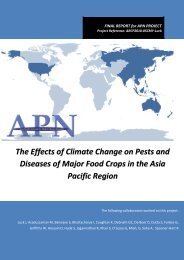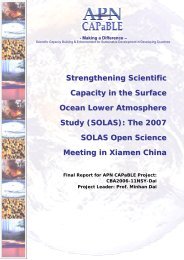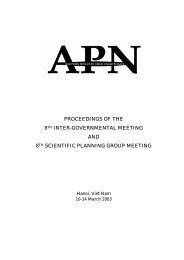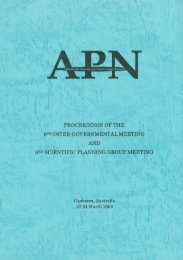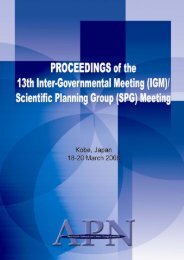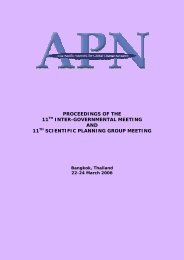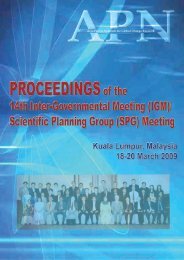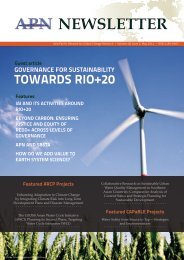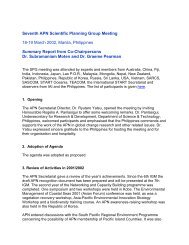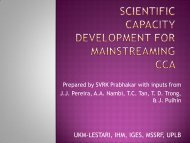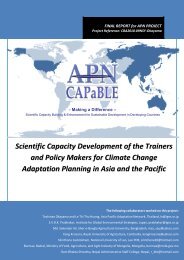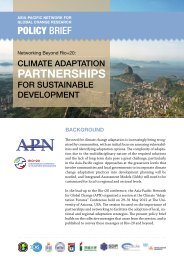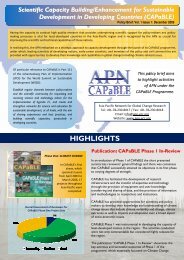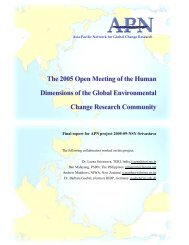2005-IGM-SPG 10.pdf - Asia-Pacific Network for Global Change ...
2005-IGM-SPG 10.pdf - Asia-Pacific Network for Global Change ...
2005-IGM-SPG 10.pdf - Asia-Pacific Network for Global Change ...
Create successful ePaper yourself
Turn your PDF publications into a flip-book with our unique Google optimized e-Paper software.
1 st CAPaBLE Standing Committee (CSC)<br />
Chairperson’s Summary<br />
<strong>IGM</strong>/10/14-01/Appendix 1<br />
<strong>SPG</strong>/10/14-01/Appendix 1<br />
Opening<br />
APN Secretariat Director, Mr. Sombo Yamamura, opened the meeting by expressing<br />
his feelings of satisfaction in terms of the good recognition and progress that<br />
CAPaBLE has made since its launch in April, 2003. (Pakistan, Thailand etc). Mr.<br />
Yamamura emphasized that now we are in Year 2 of CAPaBLE, the name and quality<br />
should go hand in hand. Main objective of today’s CSC is to discuss how we can<br />
ensure the quality of CAPaBLE in the future. Mr. Yamamura mentioned that the 3<br />
main components of the 1 st CSC Meeting were to review first year projects; discuss<br />
a plan <strong>for</strong> the current year, and discuss a plan <strong>for</strong> the future with the incorporation<br />
of CAPaBLE into APN’s 2 nd Strategic Plan <strong>for</strong> <strong>2005</strong>-2010.<br />
Item 1<br />
Dr. Andrew Matthews, <strong>SPG</strong> Co-Chair was elected as Chair of the meeting and the<br />
agenda was adopted as written.<br />
Item 2<br />
As some of the participants were fairly new to the CAPaBLE Programme, Drs.<br />
Matthews and Stevenson gave an overview of the history of the Programme and its<br />
progress since the official launch in April, 2003. The key points are highlighted:<br />
History and Progress of the CAPaBLE Programme<br />
• The initiative was registered as a Type II Partnership Programme at WSSD,<br />
Sep. 2003, by the Ministry of the Environment, Japan. The Type II<br />
Partnership addressed mainly Item 111 of the Johannesburg Plan of<br />
Implementation (JPOI).<br />
• The proposal was presented to APN 8 th <strong>IGM</strong> and was approved and endorsed.<br />
• The focus of the Programme is “Scientific Capacity Building & Enhancement<br />
<strong>for</strong> Sustainable Development in Developing Countries” with an initial 5-year<br />
phase related to Climate <strong>Change</strong> and Water & Food Security.<br />
• A “Programme Development Workshop” convened in Kobe in May 2003 to<br />
create an effective implementation plan <strong>for</strong> the CAPaBLE Programme,<br />
particularly in its first 3-year phase. Additional in<strong>for</strong>mation is available from<br />
the APN website: CAPaBLE Programme Development Workshop<br />
• Since the launch of the Programme, Hyogo Prefecture Government of Japan<br />
and 3 other member countries, Australia, New Zealand and USA have become<br />
stakeholders and are contributing financially to the Programme.<br />
• The CAPaBLE Programme effectively has 2 pillars: that of “Capacity<br />
Enhancement – vis-à-vis regional-based Comprehensive Research Projects<br />
(CRPs),” and “Capacity Building” covering a broad range of activities at the<br />
national, regional and global levels.<br />
• The main objectives of the CRPs are taken from IPCC TAR: WGII and WGIII.<br />
• 2 Comprehensive research projects and 8 capacity building projects have<br />
been funded since the launch of CAPaBLE; a summary table is attached as<br />
Appendix 1.<br />
• CAPaBLE and its activities are being showcased vis-à-vis brochures, posters<br />
presentations at various scientific and political arenas, and the APN and other<br />
GC-related organizations’ websites.<br />
Item 3<br />
The current CAPaBLE Standing Committee (CSC) and the Capacity Building<br />
�97�



